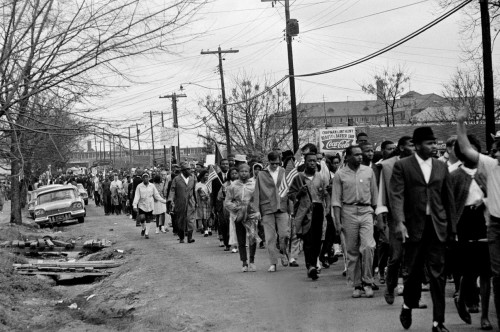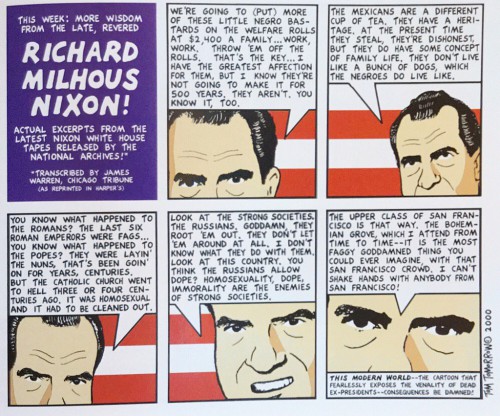Accusing someone of “identity politics” is the new, genteel way of calling them a “nigger lover”. I still remember being shocked into silence when I was about 15 years old, and my fervently Christian, home-schooling, John Bircher relation called me that, with a patronizing smile, after I tried to explain that no, black people are not more closely related evolutionarily to gorillas than are white people. He had pretensions to intellectualism, so I’m sure he would have loved the phrase “identity politics”. It’s excellent double-speak. Take a term that refers to a tendency to splinter into groups that favor narrower causes built around race, religion, or class, and apply it exclusively to any person who promotes a more inclusive, broader politics, one that crosses racial and sexual boundaries, the exact opposite of what the term implies. At the same time, avoid labeling what the white supremacists, the KKK, the alt-right, and the neo-Nazis do as identity politics, even though that would be far more accurate.
I was stunned and unable to respond when I was 15, but I’ve had 45 years now to think about it (l’esprit de l’escalier with a vengeance!). It’s been decades of being called a faggot, a Jew, a race traitor, and all sorts of variants of the identity politics insult, and I can confidently say now that it’s true: I am an old white heterosexual man, and I reject the politics of white heterosexual male supremacy, which is what you’re really trying to say. I don’t think my gender or race automatically make me a better human being. You think yours does, and that makes you a worse human being. It’s hard work to lift ourselves above our prejudices, and anyone who uses the phrase “identity politics” to disparage those who are trying is displaying their own lazily held biases. It’s virtue signaling to your fellow bigots.
I say this in response to a post by a well-regarded Atheist Hero, Sam Harris, A Few Thoughts on the “Muslim Ban”. The fact that he puts it in quotes is foreshadowing.
He makes it crystal clear that he detests Donald Trump — calling him “a malignant Chauncey Gardiner” is a good phrase — and that he thinks the implementation of the ban is terrible policy and inconsistent in its targets. But this is Sam at his oiliest: he is able to condemn Trump without reservation, but the ban…well, its real problem is that it doesn’t go far enough, and it’s undermined by those damned liberal leftists who are unable to see the true, depraved evil of Islam, the standard Sam Harris rant. You see, the real cause of all of our problems is not the right wing and demagogues like Trump, it’s the Left and their identity politics.
However, most of what is being said in opposition to Trump’s order is thoroughly contaminated by identity politics and liberal delusion. The Left seems determined to empower the Right by continuing to lie about the problem of Islamism. As David Frum recently wrote, “When liberals insist that only fascists will defend borders, then voters will hire fascists to do the job liberals won’t do.” I have been saying as much for more than a decade—and am vilified by my fellow liberals whenever I do.
Yes, Sam, you are, because we can see right through you to your conservative heart and decidedly illiberal views. That one paragraph is a perfect example.
“Identity politics” is a far right dog whistle. The only identity politics being practiced is a refusal to accept the privileges of being a white man — the only division being fomented here is between a larger vision of a united humanity and the bigotry of the status quo. It is also classic Harris to place the blame for Trump not on the people who voted for him, or the cowardly, amoral power brokers of the Republican party, or the corporatist drift of an out-of-touch Democratic party, but on the progressive, liberal people who rejected Trump and are now leading the angry opposition. It’s madness. It’s like blaming centuries of authoritarian religious oppression by the Catholic Church on those horrible atheists and pagans.
The only lying here is by Harris. He quotes David Frum — David Frum! — making the common argument that liberals can’t be true patriots, claiming that we are insufficiently zealous in being isolationist and xenophobic. There’s more to being an American than being a bigoted nativist (although, to be honest, that has historically been a significant part of being American). Liberals do not argue for the necessity of fascism to defend ourselves. It turns out that we actually think the diverse people who inhabit this country are ourselves, and what we oppose is the fascist politics of racism. The assumptions of Harris and Frum are fundamentally wrong. That we can embrace immigrants who have chosen to live in our country, whether they are Mexican or Muslim, is our patriotism, our values, our appreciation of an American identity. The America of Harris and Frum is a meaner, insular, provincial place, and that we reject their vision does not imply that we want a police state by default.
I really can’t get over the fact that he quotes David Frum to characterize liberals. Frum was a speech-writer to George W. Bush (he’s proud to have coined the Manichaean phrase “axis of evil”, which is perfectly Harrisean). He worked for the Reagan and Giuliani campaigns. He’s a neocon who supported the Iraq war. And he is the authority my “fellow liberal” Sam Harris turns to to explain liberalism? I am so unsurprised. They are very sympatico.
Then Harris says something I agree with.
It is perfectly possible—and increasingly necessary—to speak about the ideological roots of Islamism and jihadism, and even about the unique need for reform within mainstream Islam itself, without lapsing into bigotry or disregarding the suffering of refugees. Indeed, when one understands the problem for what it is, one realizes that secular Muslims, liberal Muslims, and former Muslims are among the most desirable allies to have in the West—and, indeed, such people are the primary victims of Islamist intolerance and jihadist terror in Muslim-majority countries.
Yes. I can despise Islam while at the same time recognizing that I have a moral duty to defend Muslims from oppression, violence, and discrimination. I am also able to recognize that someone identifying as Muslim has not confessed to being an Islamist on jihad. So why isn’t Liberal Sam condemning in plain English any kind of “Muslim Ban”? I can’t think of many better ways to alienate secular and liberal Muslims than making blanket prohibitions of entire nations of people from setting foot in America.
Well, I can think of one better way: we could bomb them and kill their civilians. We do that, too.
Harris, however, cannot categorically reject the Trump policy, because he favors something similar — maybe implemented with more finesse, with more carefully placed weasel words, but exactly the same in effect. So he writes a “few words” on the Muslim ban that consist of denouncements of the liberals who are out on the streets and in the airports right now protesting against this uncivil oppression. It’s telling.
Harris is not alone, however. Have you seen the latest from Steven Pinker?
Scientists' March on Washington plan compromises its goals with anti-science PC/identity politics/hard-left rhetoric https://t.co/FY5VvTbS2Z
— Steven Pinker (@sapinker) January 29, 2017
Scientists’ March on Washington plan compromises its goals with anti-science PC/identity politics/hard-left rhetoric https://goo.gl/AVB7mR
Whoa. The March for Science is anti-science? Where does that come from?
It apparently comes from “identity politics”, which in this case, means the March for Science openly invites diversity. Here’s the horrible hard-left compromising rhetoric of that web page:
In the past days, scientists have voiced concern over many issues – gag orders for government science agencies, funding freezes, and reversing science based policies. We recognize that these changes will differently and disproportionately affect minority scientists, science advocates, and the global communities impacted by these changes in American policies. Addressing these issues is imperative in understanding how recent developments will affect all people – not simply the most privileged among us. We take seriously your concerns that for this march to be meaningful, we must centralize diversity of the march’s organizers at all levels of planning. Diversity must also be reflected in the march itself —both through the mission statement and those who participate.
We hear you, and thank you for your criticism. At the March for Science, we are committed to centralizing, highlighting, standing in solidarity with, and acting as accomplices with black, Latinx, Asian and Pacific Islander, indigenous, non-Christian, women, people with disabilities, poor, gay, lesbian, bisexual, queer, trans, non-binary, agender, and intersex scientists and science advocates. We must work to make science available to everyone and encouraging individuals of all backgrounds to pursue science careers, especially in advanced degrees and positions. A diverse group of scientists produces increasingly diverse research, which broadens, strengthens, and enriches scientific inquiry, and therefore, our understanding of the world.
That’s what Pinker considers anti-science: a statement that clearly declares their intent not to discriminate. He might want to check out the NIH policies on inclusion — it’s even more thorough. I guess the NIH is anti-science.
Or perhaps he should wag an angry finger at those damned SJWs at the NSF and NASA. Totally PC. Must be anti-science. Thinking that people with disabilities, or uteruses, or too much melanin in their skin, should actually be respected for their skills is such a deplorable hard left position to take.
The March for Science also includes a blatant example of identity politics.
Who can participate:
Anyone who values science. That’s the only requirement.
Yep. Maybe that’s what annoyed Pinker. A refusal to discriminate on the basis of racial or other identity is “identity politics” to bigots.






